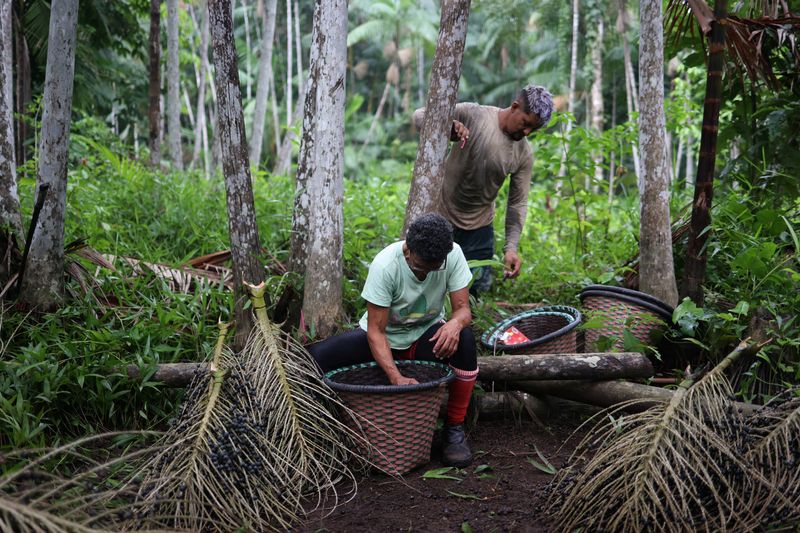By Isabel Teles
SAO PAULO (Reuters) – Within the tiny group of Ilha da Jussara, on the northern tip of the Brazilian Amazon (NASDAQ:), rising acai berries – a superfood identified for its dietary advantages – is a significant supply of revenue.
Manufacturing has grown round 50% within the final decade, pushed by a dozen or so ladies within the village who fought to safe sources of credit score.
“At first, the husbands took care of the product, of the production,” mentioned Edna dos Anjos Nascimento Siqueira, often called Bezinha, as she stripped the small darkish fruit from acai palm tree branches and positioned them in a basket. “Then we, the women, started to move.”
Bezinha, now 60, grew up following her father climbing the acai berry timber of Ilha da Jussara to reap the tart fruit, used globally in juices, cosmetics and dietary supplements.
She was the primary lady to take part in conferences to debate funding to develop the village enterprise.
Based on Emater, a authorities sustainable growth company, the involvement of ladies in such small-scale companies has grown quick in rural Brazil.
In 2021, virtually half of the agricultural credit score from a federal program overseen by Emater that helps smallholder farmers benefited feminine producers, it mentioned.
The preliminary funding in initiatives just like the acai of Ilha da Jussara is round 20,000 reais ($3,300), mentioned Lucival Solim Chavez, an agronomist at Emater.
“After that, the land is financially self-sustaining,” he mentioned.
Extra broadly, acai berry manufacturing in Brazil grew 15% between 2020 and 2023, in line with authorities statistics. Para state, the place Ilha da Jussara is positioned, accounts for 94% of the nation’s output, and is a prime exporter of the fruit to meals and cosmetics firms world wide.
In the neighborhood round Ilha da Jussara, some 200 persons are devoted to the manufacturing of natural acai. Mixed gross sales from communities within the space whole roughly 1.37 million reais ($225,000) a 12 months – over 85% of their revenue, in line with authorities numbers.
In the course of the harvest, households within the village could make fourfold the area’s minimal wage.

“We’ve achieved a lot,” Bezinha mentioned. “My friends that are part of it… they have their own little house, their own little stove, their own bathroom. For us it has been a big thing.”
($1 = 6.0559 reais)




